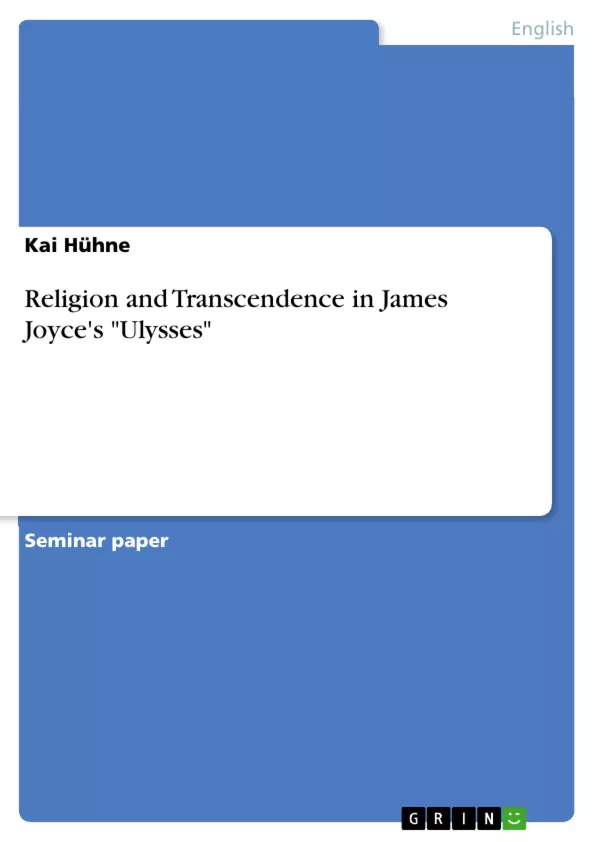The concept of transcendence is generally defined as the antonym of the notion of immanence. The material entities that are tangible and perceivable by the human senses are considered to form part of immanence, whereas transcendence is attributed to the divine and celestial spheres that elude the possibility to be grasped and handled in a way material objects can be dealt with. Owing to the fact that the two concepts of immanence and transcendence are considered to be poles apart, it is uncertain whether they are compatible with each other despite their antonymity. If the yawing gap between them should be reconcilable, this act of linking can only take place by means of a bridging relation of the complementary. An analogy to this would be the complementary relationship between allopathic and homeopathic remedies: allopathic pills are composed of chemical substances whose existence can easily be verified in a laboratory, whereas homeopathic tablets do not contain the physical substance of the respective herbs, metals or even venoms, but on the contrary the respective energetic correlate of them that eludes scientific methods of verification. Accepting the possibility of being cured by homeopathy is tantamount to embracing the existence of transcendence. By means of this comparison I seek to highlight that there must be mutual intermingling between the seemingly disparate antonyms of immanence and transcendence, owing to the fact that transcendence needs a material vehicle as a solid fundament in order to function and in order to be perceived by human beings.
Inhaltsverzeichnis (Table of Contents)
- Defining the concept of transcendence.
- Methodological problem and “challenge” of analysing patterns of transcendence.
- Immanence and transcendence as complementary antonyms.
- The equivalent of the notions of immanence and transcendence in "Ulysses"
- Diaphany – bridging the “yawning gap” between immanence and transcendence .
- Reincarnation or Metempsychosis? – Mixing up concepts of transcendence
- Approaching the function of religion in Ulysses – Preliminaries .....
- Negative theology as a means to tie concepts of religion to a new literary function
- Buck Mulligan: a “pagan” naturalist initiating Stephen's Christian path ……....
- Symbolism: the counterpart of naturalism.
- Bloom: elevated to the status of God's son..
Zielsetzung und Themenschwerpunkte (Objectives and Key Themes)
This essay aims to explore the concept of transcendence in James Joyce's novel "Ulysses" and analyze how it is intertwined with the material world, particularly in relation to religious themes.- Defining transcendence and its relation to immanence
- The challenges of analyzing transcendence within a literary work
- The role of religion as a material foundation for transcendence in "Ulysses"
- The function of symbolism and intertextual references to the Judeo-Christian tradition in the novel
- The exploration of the relationship between immanence and transcendence through specific characters and narratives
Zusammenfassung der Kapitel (Chapter Summaries)
- Chapter 1: This chapter defines the concept of transcendence as the opposite of immanence, and explores the complex relationship between these two concepts. It argues that transcendence requires a material vehicle for its manifestation and perception, and that the two are inherently interconnected.
- Chapter 2: This chapter addresses the methodological challenges of analyzing patterns of transcendence within a literary work, particularly in the context of empiricism and the subjective nature of transcendent experiences. It uses the example of the human cell to illustrate the structured nature of immanence and contrasts it with the non-structured nature of transcendence.
- Chapter 3: This chapter continues to explore the interplay between immanence and transcendence, arguing that they are complementary antonyms. It uses the analogy of homeopathic remedies to highlight the necessary interconnection between material substances and transcendent energies, suggesting that one cannot exist without the other.
- Chapter 4: This chapter examines how the concepts of immanence and transcendence are embodied in "Ulysses." It argues that traditional religious figures and institutions serve as the material foundation for the transcendental allusions in the novel. It draws a parallel between religious figures and the material substance of homeopathic remedies, while the transcendent elements are equivalent to the energetic values of those remedies.
Schlüsselwörter (Keywords)
The main keywords and focus topics of this essay are: transcendence, immanence, religion, "Ulysses," James Joyce, symbolism, intertextuality, Judeo-Christian tradition, materiality, empiricism, and literary analysis. The essay explores the complex interplay between these concepts and their manifestation within the context of the novel.Frequently Asked Questions
How is transcendence defined in the context of James Joyce's 'Ulysses'?
Transcendence is defined as the antonym of immanence, referring to divine spheres that elude material touch but require a material vehicle to be perceived.
What is the 'bridging relation' between immanence and transcendence discussed in the text?
The author uses the analogy of homeopathy to show how material substances (immanence) can act as carriers for energetic or spiritual values (transcendence).
Which characters in 'Ulysses' are linked to religious or transcendent themes?
The essay discusses Buck Mulligan as a 'pagan' naturalist, Stephen Dedalus's Christian path, and Bloom being elevated to the status of God's son.
What role does 'Negative Theology' play in the essay?
Negative theology is analyzed as a means to connect religious concepts to new literary functions within Joyce's modern narrative.
What are the methodological challenges of analyzing transcendence in literature?
The challenges include the subjective nature of transcendent experiences and the difficulty of applying empirical scientific methods to non-structured spiritual concepts.
- Arbeit zitieren
- Kai Hühne (Autor:in), 2008, Religion and Transcendence in James Joyce's "Ulysses", München, GRIN Verlag, https://www.hausarbeiten.de/document/117511


